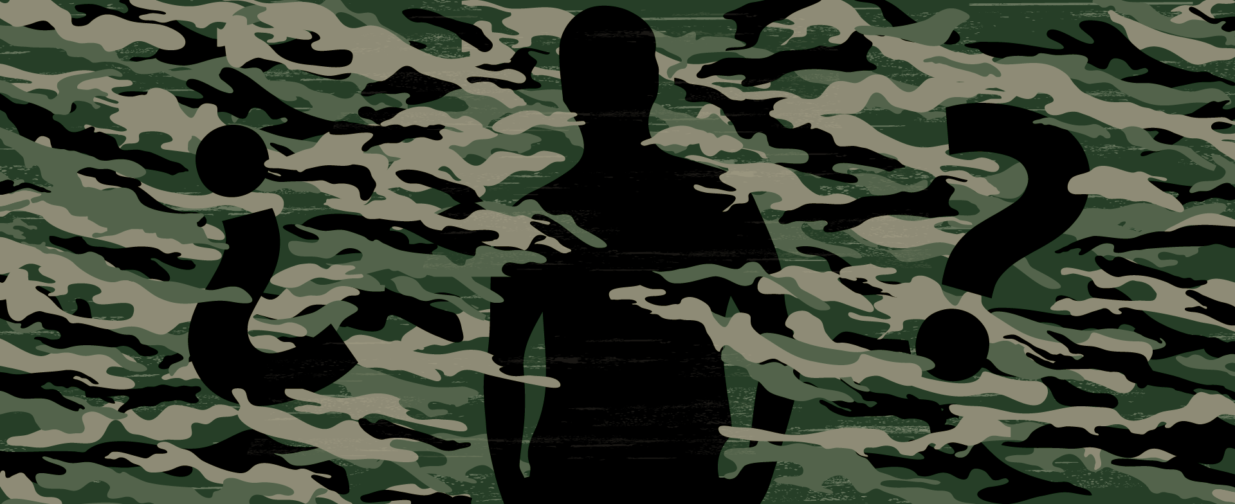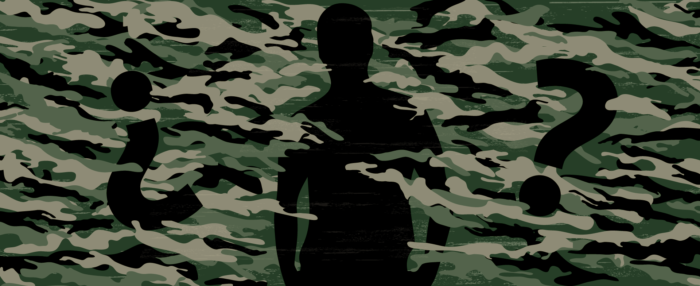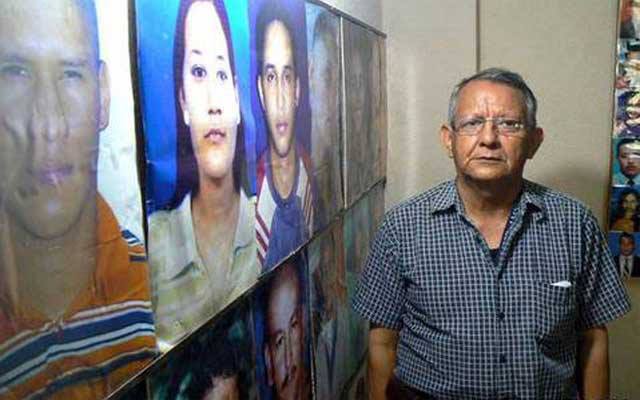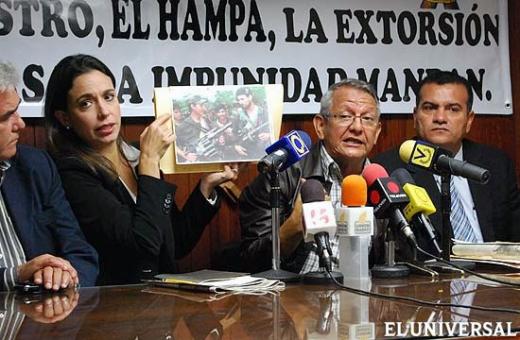

The narrow victory of the No in the plebiscite called by the president of Colombia, Juan Manuel Santos, to endorse the peace agreement reached by FARC in Havana, Cuba, represents a stop along the way, perhaps the last stop, before the internal conflict ceases. With the imminent conversations that ELN will also initiate in Quito, the relatives of the persons disappeared in the state of Barinas wonder if their relatives, alive or dead, remain in the hands of FARC.
|
Getting your Trinity Audio player ready...
|
Barinas.- Most kidnapped by FARC in Venezuela lived in Barinas, the home state of the leader of the self-styled Bolivarian revolution, Hugo Chávez.
In that province of the western plains the disappearances of young people without apparent reason increased in 2009. In that year, it was learned of the abduction of two infants. The small Ben Jing Shoung Cano, of three years of age, son of the well-known merchant of Chinese origin Leo Shoung —rescued safe and sound after remaining several days in the power of a group of Colombian and Venezuelan bandits— was perhaps the most relevant because it generated a 24-hour protest, which included the closure of stores run by Chinese and Arabs, who usually turn their backs on this kind of demonstrations when they are called by political parties.
It was a milestone in the recent history of the region. Dozens of people stood with banners in the well-known traffic circle of Cada (the old supermarket already disappeared) to demand the release of the minors. Suddenly, the community was aware of what was happening. Many young people disappeared and no one ever heard from them again. Week after week, people learnt about new cases. News came about dead youngsters. It was the same pattern.

The news was so recurrent that it stopped having an impact for some, but not for Oscar Pineda, a retiree who was then 60 years old. Over the months, Pineda would be put in charge of an NGO called Peace and Life Committee for Human Rights. He sensed something in the environment. Some would call him crazy when they saw him with his brown briefcase full of newspaper clippings and the list of each disappearance reported in the media of the region.
Pineda found that the disappearances could not only be attributed to the action of the mafia construction trade unions or to individuals who acted outside the law taking advantage of their links with the local government. Many of those disappeared ended up in the ranks of the Revolutionary Armed Forces of Colombia (FARC), who then found in the spillway of Venezuela the tranquility they did not have in their country. With the help of the United States of America, the government of President Álvaro Uribe Vélez (2002-2010) began an all-out war against the guerrillas that decimated its troops and reduced its area of ??influence.
In 2015, Pineda, always with his brown briefcase, even wanted to raise the case of the disappeared in Barinas to the Colombian ex-senator Piedad Córdova. On March 23 of that year, the leader of Movimiento Poder Ciudadano Siglo XXI, the one with the permanent turban, known for her close friendship with Hugo Chávez, was on the same plane that Pineda would board that afternoon.
There she was surrounded by glances on the way to her seat. Pineda recognized her immediately. Trying to get close to Piedad Córdova seemed easy until escorts went through. "What do you want?" They asked him. "I want to talk to the Senator about the cases of kidnappings in Barinas." When she heard, Córdova said, "Let’s talk in Caracas." She never received him.
Maybe Pineda would have shown her the photo that circulated in the newspaper De Frente (pro-government and currently out of circulation), in Barinas. It was fate that information about FARC was illustrated with an image of the AFP agency file, and that the editor at that time chose the picture. There was the lost son of a humble woman.
"We saw the picture on the newspaper and my son appeared in a military suit."
Wilfredo Valero Díaz was kidnapped on April 6, 2009, at age 19. It was a Monday, at 12:36 PM, when the young man was in a hairdresser near his home. Four armed men descended from a truck to take him by force. Nobody could do anything.
"We saw the picture on the newspaper and my son appeared in a military suit. I went to the Police Headquarter and spoke with Commander Cacioppo, with Governor Adán Chávez, with Mayor Abundio Sánchez. I delivered a letter to President Chávez in his hands and to date, I never had an answer about my son," recalls Zaida.
This woman received a call from a stranger telling her not to lose hope of seeing her son. She recalls that she paid Bs. 40 million (Bs. 40,000 after the monetary redenomination) for the rescue.
Seven years have passed, though the sadness remains the same. The story of her drama is moving. A few months after the disappearance of her son, depression attacked her to the point of completely losing her hair. She endured the peeling of the skin and not being able to sleep. "It was two years without being able to work. As long as I do not see him dead, to me he is alive."
The long-awaited peace agreement between the Colombian government and the FARC guerrillas is also a relief for many Venezuelan families. "I am calling on President Santos to please have peace, so we can have our relatives back. In 2009, it was not only my son. Many other mothers also experienced the pain of the disappearance of their sons. I also ask President Maduro to help us. There were many missing here and none of us have an answer."
The day after that famous picture, several radio programs mentioned this news, which removed the entrails of a city. Oscar Pineda approached the broadcaster in the state at that time, Radio Sensacional 94.7 FM (the National Telecommunications Commission would suspend it in August 2014) and offered details of what was happening in Barinas.
But Wilfredo Valero was not the only one. Many cases were reported, the list grew every week and also the suspicions that some disappeared could be in the hands of the Colombian guerrillas.
Shoes
as proof of life. Alfonso Alejandro Briceño Piña was kidnapped on January 29,
2010.
He was then 20 years old and was in the third semester of Tax Administration. He is the eldest son of Rosa Gisela Piña. She has had to cope with widowhood in the absence of Alfonso, her pillar.
"They told us to look for him by ourselves, to call the auto repair shop to declare, but we have not heard anything," she recalled. Alfonso was taken from an auto body shop very close to the Barinas Airport. Four men threatened him with a gun in front of the owner of the repair shop. That afternoon, he coincided in the business with an official from the Venezuelan Investigative and Criminal Police Corps (CICPC), who was having his car repaired.
Alfonso, very fond of showing off his little "chimonera", where chimó is prepared, a tobacco-based product, commonly used in the Andean and states and the plains) did not seem to be a potential victim of kidnapping. "Maybe they thought we had money," speculates Rosa.
They described how she was dressed. They left Alfonzo's shoes at the entrance of the house.
Three days after, they began receiving calls daily. They described how she was dressed. They left Alfonzo's shoes at the entrance of the house. They had passwords of a debit card and they knew the day of their son's high school graduation.
That Holy Week, she gave 300 thousand bolivars, but "Alfonsito" did not appear. "They told me to leave, they asked me to go around and around via Barrancas, near La Yuca river, and to throw the money from the bridge over the highway to San José Obrero."
Seven months later, she received a call at 10:00 PM. "Mother, mother!" a voice said on the other side of the phone. Only Alfonso used to call her like that. The number showed the area code of the state of Delta Amacuro (easternmost province of Venezuela). Then, Rosa found out that the phone belonged to an inmate and had passed through several hands before she heard her son's voice.
On June 9, 2009, occurred the kidnapping of Luis José Barrios Silva, aged 19. The case was reported by his mother Livia Silva before the NGO, Peace and Life Committee for Human Rights. The incident occurred on a well-known avenue in the Municipality of Barinas, as in the case of Wilfredo, in front of the city's airport. That day, he was with his friend Adrián Arturo Moreno Rodríguez, of the same age.
Apparently,
they had been arrested by motorized National Guard, who asked for their IDs.
Then,
—according to Livia's story— the officials called by phone. After a
while, two SUVs appeared. Around six people dressed in civilian clothes came out
and talked to the youngsters. Adrián was forced into one of the vehicles and
Luis was taken on the back of a motorcycle. The only witness who was at work
that afternoon witnessed when they were taken away. "We do not know if they were
actual officials or not."
This happened on a Tuesday. "On Friday," says Livia, "they called me at 5:00 PM. A man with Colombian accent told me that if I wanted to know about my son, we had to meet; that they had been taken by a lieutenant and four other officials. He was in a farm in San Silvestre. I had to pay," explains this woman, recalling that day when everything changed for her.
She could not communicate with that man never again, and she lost the only trace. A person of her trust went to Arauca, state of Apure (border with Colombia), and was informed that the young man had been sold to an irregular group.

Days after, she received another call with a Táchira state code and was informed that her son was going to be sold to FARC because she had not paid.
Livia talks about her visions. As a Christian woman, she has asked for revelations, some indication. "I watched a helicopter when they threw those boys in a mountainous area where there was a refrigerated truck. They put them in there."
After the publication of Wilfredo Valero’s picture, they tried to communicate with "Voces del Secuestro " (Voices of Kidnapping), the very tuned program of Herbin Hoyos that the captives listen to in the Colombian jungle. "Months after the events, I sent messages to my son, to FARC and to Noticiero de Colombia." To this day, neither the Venezuelan judicial police nor the Anti-Extortion and Kidnapping Group (GAES) have given her any news about his whereabouts.
Miletza Sosa, sister of Rodolfo Antonio Meléndez Sosa, who disappeared when he was 32 years old, on September 20, 2008, who has assumed the search from the beginning. Her messages on the social media Facebook are always a reminder of the years that go by, of the birthdays and absences of Rodolfo.
On the day of his abduction, they went to a farm thy own when they were intercepted by some officials, presumably from the Cicpc (criminal investigation police), who where in a mobile check point. Rodolfo, an uncle and his wife, his brother's girlfriend and four girls were in the car. The women were released at 11 PM and the uncle, two days later. They were all taken to a house. One of the individuals had a bracelet on one of his arms with the acronym of Front 10, which contained a rifle with a cross-flag.
"I requested a certificate of life and they never gave it to me."
The men were kept for two days on a farm in San Silvestre, municipality of Barinas. Then, they were taken out of the country through the state of Apure. Only Rodolfo remains in the hands of that group. But when they were in San Silvestre, the uncle could observe the place where they were when he had a chance to remove the bandage. Many black long boots, a nice house, with lots of logistics. A young man who was in the place told them to behave well, that nothing would happen to them, that he was also a captive. Pictures of all of them were taken.
"One month after, a man that they called "commander" got on the phone to ask for 500 million bolivars. I requested a certificate of life and they never gave it to me," explains Miletza.
There are so many cases. Andrés Eloy Blanco Fernández, 26, kidnapped on December 1, 2009, in the town of La Luz, Municipality of Bishops. The ransom was paid, but he never reached home. His parents have made unsuccessful efforts.
According to an urban legend widespread in the area during those years, he had been thrown to Pepito, the caiman, a pet of one of the powerful construction unions at that time. A protected witness gave a statement at the time, but then he retracted when he was threatened and blackmailed, and never again spoke of what happened. When he was interviewed for the first time, he even said –newspaper clipping in hand- that the young man had been murdered. But there have never been signs.
But some kidnappings extend over time, like Pedro Antonio Zambrano’s, which occurred on September 9, 2006, when he was 42 years old, a producer, originally from the town of the Municipality of Pedraza. As a certificate of life, they sent the mother a finger and then a video showing the missing tip.
Nelson Alí Sánchez, who disappeared on December 25, 2009, was 38 years old. He was engaged in the sale of fish. Six hooded men with short weapons broke into his home and took him away without saying a single word. He screamed not to take him away, that he had not done anything. The men arrived in a four-door truck, double cab, and small car.
His father, Jacinto González, would come that day to talk with the neighbors and determine if there was something strange. "Both they and I were surprised. Why did that happen to him if he was a quiet man, coming from the river with the fish?"
They never called Jacinto. The authorities remained silent. "Our hope is that the security forces bring my son alive or dead, even his bones. That’s my hope."
A couple of years ago, Oscar Pineda said in an interview with the press that the Colombian guerrillas would have at least five hostages who lived in Barinas when they were kidnapped. Today, he reiterates it and asks to write down the case of a young nurse from Táchira who had been in the hands of the guerrillas for several years. "I only remember that her name is María and her case has been reported by the state of Tachira media." Meanwhile, the days go by and the peace agreement, with its setbacks, is the flavor of the month in Colombia. But nobody gives answers to those families.
Adrián Perdomo Mata has just entered the list of sanctioned entities of the US Department of the Treasury, as president of Minerven, the state company in charge of exploring, exporting and processing precious metals, particularly gold from the Guayana mines. His arrival in office coincided with the boom in exports of Venezuelan gold to new destinations, like Turkey, to finance food imports. Behind these secretive operations is the shadow of Alex Saab and Álvaro Pulido, the main beneficiaries of the sales of food for the Local Supply and Production Committee (Clap). Perdomo worked with them before Nicolás Maduro placed him in charge of the Venezuelan gold.
Gassan Salama, a Palestinian-cause activist, born in Colombia and naturalized Panamanian, frequently posts messages supporting the Cuban and Bolivarian revolutions on his social media accounts. But that leaning is not the main sign to doubt his impartiality as an observer of the elections in Venezuela, a role he played in the contested elections whereby Nicolás Maduro ratified himself as president. In fact, Salama, an entrepreneur and politician who has carried out controversial searches for submarine wrecks in Caribbean waters, found his true treasure in the main social aid and control program of Chavismo, the Clap, for which he receives millions of euros.
While the key role of Colombian entrepreneurs Alex Saab Morán and Álvaro Pulido Vargas in the import scheme of Nicolás Maduro’s Government program has come to light, almost nothing has been said about the participation of the traders who act as suppliers from Mexico. These are economic groups that, even before doing business with Venezuela, were not alien to public controversy.
Even though there are new brands, a new physical-chemical analysis requested by Armando.Info to UCV researchers shows that the milk powder currently distributed through the Venezuelan Government's food aid program, still has poor nutritional performance that jeopardizes the health of those who consume it. In the meantime, a mysterious supplier manages to monopolize the increasing imports and sales from Mexico to Venezuela.
Turkey and the coastal emirates of the Arabian Peninsula are now the homes of companies that supply the main social -and clientelist- program of the Government of Venezuela. Although the move from Mexico and Hong Kong, seems geographically epic, the companies has not changed hands. They are still owned by Colombian entrepreneurs Alex Nain Saab Morán and Álvaro Pulido Vargas, who control since 2016 a good part of the Import of food financed with public funds. Around the world for a business.
Since the borders to Colombia and Brazil are packed and there is minimal access to foreign currency to reach other desirable destinations, crossing to Trinidad and Tobago is one of the most accessible routes for those in distress seeking to flee Venezuela. Relocating them is the business of the 'coyotes' who are based in the states of Sucre or Delta Amacuro, while cheating them is that of the boatmen, fishermen, smugglers and security forces that haunt them.
When Vice President Delcy Rodríguez turned to a group of Mexican friends and partners to lessen the new electricity emergency in Venezuela, she laid the foundation stone of a shortcut through which Chavismo and its commercial allies have dodged the sanctions imposed by Washington on PDVSA’s exports of crude oil. Since then, with Alex Saab, Joaquín Leal and Alessandro Bazzoni as key figures, the circuit has spread to some thirty countries to trade other Venezuelan commodities. This is part of the revelations of this joint investigative series between the newspaper El País and Armando.info, developed from a leak of thousands of documents.
Leaked documents on Libre Abordo and the rest of the shady network that Joaquín Leal managed from Mexico, with tentacles reaching 30 countries, ―aimed to trade PDVSA crude oil and other raw materials that the Caracas regime needed to place in international markets in spite of the sanctions― show that the businessman claimed to have the approval of the Mexican government and supplies from Segalmex, an official entity. Beyond this smoking gun, there is evidence that Leal had privileged access to the vice foreign minister for Latin America and the Caribbean, Maximiliano Reyes.
The business structure that Alex Saab had registered in Turkey—revealed in 2018 in an article by Armando.info—was merely a false start for his plans to export Venezuelan coal. Almost simultaneously, the Colombian merchant made contact with his Mexican counterpart, Joaquín Leal, to plot a network that would not only market crude oil from Venezuelan state oil company PDVSA, as part of a maneuver to bypass the sanctions imposed by Washington, but would also take charge of a scheme to export coal from the mines of Zulia, in western Venezuela. The dirty play allowed that thousands of tons, valued in millions of dollars, ended up in ports in Mexico and Central America.
As part of their business network based in Mexico, with one foot in Dubai, the two traders devised a way to replace the operation of the large international credit card franchises if they were to abandon the Venezuelan market because of Washington’s sanctions. The developed electronic payment system, “Paquete Alcance,” aimed to get hundreds of millions of dollars in remittances sent by expatriates and use them to finance purchases at CLAP stores.
Scions of different lineages of tycoons in Venezuela, Francisco D’Agostino and Eduardo Cisneros are non-blood relatives. They were also partners for a short time in Elemento Oil & Gas Ltd, a Malta-based company, over which the young Cisneros eventually took full ownership. Elemento was a protagonist in the secret network of Venezuelan crude oil marketing that Joaquín Leal activated from Mexico. However, when it came to imposing sanctions, Washington penalized D’Agostino only… Why?
Through a company registered in Mexico – Consorcio Panamericano de Exportación – with no known trajectory or experience, Joaquín Leal made a daring proposal to the Venezuelan Guyana Corporation to “reactivate” the aluminum industry, paralyzed after March 2019 blackout. The business proposed to pay the power supply of state-owned companies in exchange for payment-in-kind with the metal.